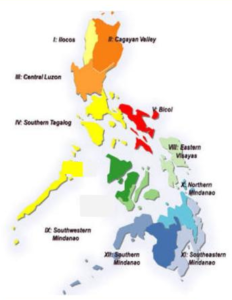AIDE records high enrollment rate from the National Capital Region (NCR), Regions IV-A and III

True to its commitment of widening student access to higher education, the Asian Institute for Distance Education, Inc. (AIDE) obtains greater number of enrollees from the outskirts of Metro Manila or the National Capital Region (NCR) for the year 2018. From January to April of this year, the Institute recorded an increase intake from several regions of the Philippines. From the figures reported by the Institute’s Registrar Office, almost all Regions in the country, the AIDE was able to generate student enroll- ment except for four (4) regions i.e. Region VI, VII, XIII and ARMM.
The NCR remains to be the region with the highest source of enrollment. Almost fifty three percent (53%) of the intake of AIDE for 2018, specifically from January to April, are from the NCR. Meanwhile, twenty-five percent (25%) of the enrollment for the same period was recorded to be sourced from Region IV-A or the CALABARZON which is composed of the provinces of Cavite, Laguna, Batangas, Rizal and Quezon. Region IV-A/CALABARZON was recorded to have the second highest source of enrollment next to the NCR. Calabarzon is said to be the second highest contribu- tor to the country’s national mGDP. The region was also recorded to have an inflation rate lower than the national average. Much like the rest of the country’s region, it is caught in the middle of being an industrial and an agricultural economy. Because of its proximity to the NCR, high urbanization rate has taken in the region over the years. It is also known for the seat of big manufacturing and high-tech industries, although agricultural areas and fisheries are also among the sources of livelihood among the inhabitants.
Region III was recorded to be the third (3rd) highest source of intake in AIDE. This region is also known as Central Luzon which is com- posed of the provinces of Aurora, Bataan, Bulacan, Nueva Ecija, Pampanga, Tarlac and Zambales. The Registrar’s Office of AIDE recorded a total of nine percent (9%) enrollment in this region. To further expand wider access to open learning and distance education, AIDE commits to reach more enrollees and students in the coming years from other regions of the Philippines. Through this, the institute will be able to contribute to the goal of the Philippine government to provide working students and school leavers the opportunity to earn a college degree. the need to support and promote the institutionalization of distance education and other alternative means of providing higher education to expand access of many Filipinos to college degrees.
In realizing the need to expand access to higher education, the government intends to accomplish and pro- mote the Expanded Tertiary Education Equivalency and Accreditation Program (ETEEAP), Ladderized Education Program (LEP), and Distance Education to provide many working students and school leavers the opportunity to earn a degree. By reaching higher number of enrollees from the farflung and rural areas of the country, the institute, in a way, is contributing to the realization of the goal to expand access to higher education.
Through the years, the institute commits to reach and able to graduate more Filipinos and OFWs who were not able to finish college due to various reasons and constraints of time, distance, money and other personal and professional limitations. In the coming years, AIDE will strengthen its effort to make higher educa- tion more accessible and flexible to many.
In This Issue
- AIDE records high enrollment rate from NCR, Regions IV-A and III
- AIDE contributes to the Goal of Expanding Access to Higher Education
“The Philippine Development Plan 2017-2022 aims to reduce inequalities in human development outcomes. In particular, it aims to ensure lifelong learning opportunities for all, and increase the income-earning ability of Filipinos.”
-Philippine Development Plan
(PDP) - 2017-2022
Source: http://www.neda.gov.ph
Mrs. Zenaida Villaescusa
Editor-In-Chief
Ms. Marichu B. Ebdani
Ms. Susan B. Sanders
Ms. Juvy C. Bangued
Editorial Staffs
